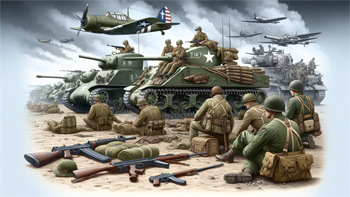World War II, a global conflict that lasted from 1939 to 1945, involved most of the world's nations and marked one of the deadliest and most impactful periods in human history. The war was primarily between the Allies, led by the United States, the Soviet Union, and the United Kingdom, and the Axis, led by Germany, Italy, and Japan. It reshaped the world politically, socially, and economically, leaving a lasting imprint on the global landscape.
The Origins and Causes of World War II
The war's roots can be traced back to the unresolved issues of World War I and the Treaty of Versailles. The harsh penalties imposed on Germany, the rise of fascism, and the aggressive expansion of Nazi Germany under Adolf Hitler, along with the appeasement policies of other European powers, set the stage for a new global conflict. The invasion of Poland by Germany on September 1, 1939, is generally considered the starting point of the war.
Key Events and Turning Points
World War II was marked by several key events and turning points. The Battle of Britain (1940) was a significant early conflict, showcasing the strength and resilience of the British air force against the German Luftwaffe. The entry of the United States into the war in 1941, following the Japanese attack on Pearl Harbor, dramatically shifted the balance. Major battles, including Stalingrad (1942-1943), Midway (1942), and Normandy (D-Day, 1944), played crucial roles in determining the outcome of the war.
Technological and Military Innovations
The war saw significant advancements in military technology and tactics. The development and use of tanks, aircraft carriers, submarines, and aircraft improved dramatically. The war also marked the first use of nuclear weapons, with the United States dropping atomic bombs on the Japanese cities of Hiroshima and Nagasaki in 1945, leading to Japan's surrender and the end of the war.
The Holocaust and War Crimes
A tragic and defining aspect of World War II was the Holocaust, the systematic genocide of six million Jews by Nazi Germany. Other groups, including Romani people, disabled individuals, and political dissidents, were also targeted. The war also saw numerous other war crimes, leading to the establishment of the Nuremberg Trials, where key Nazi leaders were prosecuted for their crimes against humanity.
The Global Theatre and International Involvement
World War II was truly a global war, with battles fought in Europe, Africa, Asia, and the Pacific. Nations from around the world were involved, either directly in combat or through economic and military support. The war led to significant changes in colonial relationships and the emergence of the United States and the Soviet Union as superpowers.
Post-War Impact and Reconstruction
The end of World War II brought significant challenges in terms of rebuilding and reorganizing nations. The United Nations was established in 1945, aiming to prevent future conflicts. Europe faced a massive rebuilding effort, leading to the Marshall Plan, which provided US aid for European reconstruction. The war also set the stage for the Cold War, a prolonged period of geopolitical tension between the United States and the Soviet Union.
The Legacy of World War II
World War II's legacy is profound and far-reaching. It led to significant shifts in global power, the creation of new nations, and the realignment of international borders. The war's impact on culture, society, and memory continues to be felt, with its lessons and experiences still shaping the world today.

